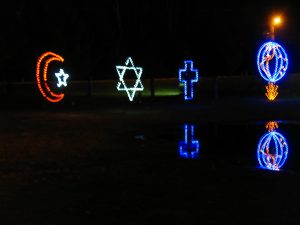
My grandfather was not a Jew by choice. In 1930s Europe, being a Jew was a curse, and one that promised death. Born in the Jewish ghetto of Vienna, he was given the name of Erich Christian Schwarz, a triumphant effort at masking the family’s heritage through words. My grandfather escaped Europe by hope, beautiful coincidence, and profound vivacity, so that I could be born an American shiksa: a gentile girl devoid of the Jewish burden. Now, 18 years later, I choose to spite him. I proudly call myself a Jew, and it has allowed me a greater understanding of my family and our people than I ever had before.
I will not be the first to say that discovering religion has done me a service. Even now, years after beginning my new immersion into Jewish culture, the words sound saccharine and cliched. I want my experience to be an original one, but I know it has never been. The faith has a power that, regardless of our willingness to admit it, has ensnared and enraptured countless people since the dawn of time. This may be for good reason, as I have learned.
The first time I went to a Shabbat service, I was skittish and afraid. Shaking the hand of the rabbi, decorated in kippah, tzitzit, and tallit, I felt as if the entire history of my people was held between our fingertips, compelling me to speak. I was unable, though, and in his joking way the rabbi demanded my name, surprised I had not offered it already. I passed through the metal detector like a strangely morbid arch, a sacred rite of passage, transferring me to a spiritual realm. Weeks later, the rabbi asked for my name once more, and then remembered it forever.
By coincidence, I had joined the synagogue in the weeks before the riots in Charlottesville, Virginia occurred. Every day the week of the violence, I woke up to frightening news alerts and testimonials, everyone preaching the word of sheer panic. Without realizing the cause, I felt more strongly compelled than ever that week to make it to Shabbat. Sitting in the same row as I always chose, gazing around the room, I felt that I was not alone. More members of the congregation than I had ever seen were there, gathered around our songs and prayers, joining voices in blessing for the day of rest and saying Kaddish not just for our loved ones, but for the peaceful image of America we felt compelled to willfully resurrect.
My grandfather passed away long before I was born. My grandmother, however, lives on and tells a very different story of her own upbringing. Not a holocaust victim, but rather an American Jew, she describes her family’s hiding of their faith, their conversion to Catholicism, and now her passionate belief in the Christian tradition. As a child, I struggled to understand her choice to convert rather than embrace the Judaism she was born with. Since I have begun to take my own spirituality more seriously, however, I feel that I understand her completely. Raised in the America of WWII and its aftermath, she had no choice but to abdicate her tradition, and find faith in another one instead.
My grandmother is but one of the people my religion has helped me understand. It has also Introduced me to a community of people who share my history, and it has allowed me to learn about myself from them. What my grandfather never could have told me – what he would have been too frightened or ashamed to admit – I have learned from becoming Jewish again.
